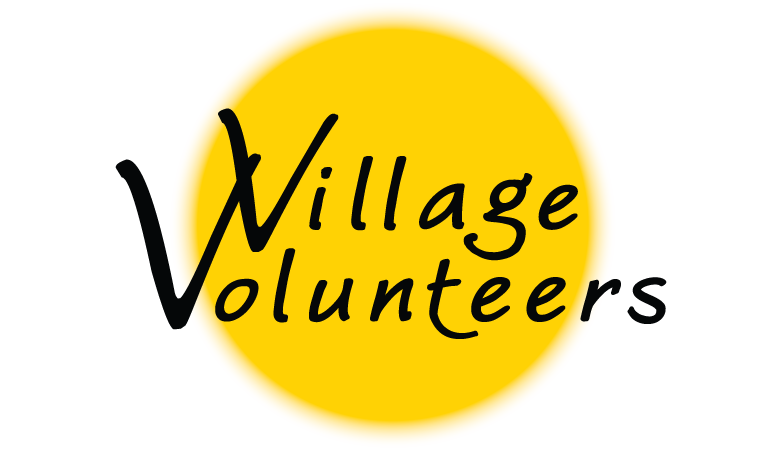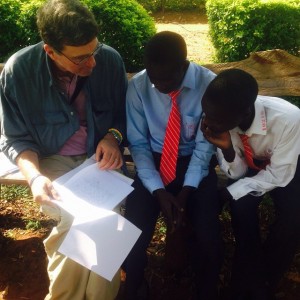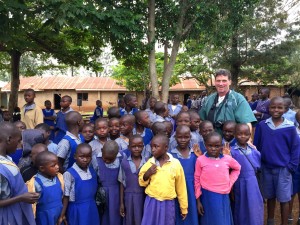By Brett Weiss
On June 8th I took off from O’Hare Airport on my fourth trip to Kenya in the last 6 years. I was joined by Emily Egan who is a Religion Teacher at St. Viator High School in Arlington Heights, IL. I am a Social Studies Teacher at Bartlett High School in Bartlett, IL.
Most of my time in Kenya has been spent in the tiny village of Dago which has 3,000 people and is as poor as poor can be. The average family income in Dago is less than $2.00 per day. They have no electricity or plumbing, live in mud huts, pretty much their only clothes are hand me downs from charities and many are not sure where their next meal is coming from.
A bit of history: after my first trip through Village Volunteers, my students, friends, family and I did a variety of things to try to help the people of Dago. This included things like 100 new pair of shoes for children, backpacks, school uniforms, two cows, etc. Then I wanted to do something more substantial. As an educator, I recognize the core of the problem is a lack of education. The average Kenyan has only four years of school. In places like Dago, only about half of the children even make it to 8th grade and most of those are boys because of all of the extra challenges girls have to face that boys do not have to worry about. Very few ever get to high school because it really needs to be paid in its entirety by the family and most families cannot even come close to paying the fees. Over the years very few people from Dago had ever gone to high school.
Thus in 2011, we started the Bernard and Elsie Weiss Dago Scholarship Fund. The mission is to send as many Dago children to high school as possible. Two of the key rules are that all money is evenly divided between boys and girls and when we commit to a child it means we have enough money in the bank to cover all four years.
We established the “equality” rule because the main determinant of who gets the scholarship is the student scores on an exam all 8th graders in Kenya take called the “Kenyan Certificate of Primary Education” (KCPE). Since girls have many extra challenges that boys do not have, they tend to score lower on the exam. In a small fund like ours, if we gave out scholarships just based on scores, it would be very hard for girls to ever get a scholarship. We know that if you give a girl a chance, she will do just as well as a boy, if not bett , if she gets the opportunity.
We established the rule about having enough money upfront for all four years because I learned that quite often scholarships given in poor countries such as Kenya go year to year, and many times students are told after a year or two that there is no more money for them and their high school days are over. I would not ever want to be in a position to have to deliver such news to a child.
Since 2011 we have awarded 17 scholarships and those students are going to 12 different boarding high schools in Kenya. They range from first-year to fourth-year students. My main item on my agenda for the three weeks we just spent in Kenya was to visit all of these children at their respective schools and get to spend some quality time with them and some of the staff of the school. We did all of this and it was such a wonderful feeling to spend time with them and listen to what they have to say. They are all incredibly appreciative of the opportunity they have been given. At school, for the first time the world beyond Dago is beginning to open up for them. They have electricity, plumbing, three good meals, nice clothes and a great learning environment. Then, because of all of this the entire world is opening up to them through what they are learning, books, TV, the internet, etc. They see there is a much better way of life than the life they had back in Dago, and there is a much better life for them beyond high school. They are all working very hard to be successful.
We spent time with each student going over their report cards and talking about the areas they need to do better in. We checked in on all of their needs, both personal and school, to see how we can be of further help to them. We also spent quality time with many of the school administrators and teachers talking about how we can all work together to help these students. It was great to share our experiences as educators and how we can all help our students. I collected lots of email addresses and mobile numbers and will be following up with all of them.
Also during our trip, we spent a lot of time at the Dago Primary School visiting the children and teachers. They are all very aware of the scholarship fund and want to work hard to have the opportunity to go to high school. We spent a lot of time with the teachers and the parents. A lot of what we were doing is encouraging them to work even harder and asking the parents to make sure education is their number one priority. One of the issues we deal with is some parents had very little schooling and their attitude can be that education is not important. Also, because of the extra challenges girls have, we try to help them understand that education is just as important for the girls as it is for the boys.
A key goal of mine for this trip was to address language issues. In Dago, their first language is Luo, their tribal language or what they refer to as their “Mother Tongue”. When they are young they also learn English and Kiswahili. In reviewing all of the report cards of the Dago children who are in high school these last few years, a real trend is the Dago children tend to do poorly in the subjects of English and Swahili. There are many reasons for this including that some parents really only know Luo and the teachers tend to speak Luo to them when not in the classroom setting. They are now going to school with students from larger communities who tend to have had much more exposure to English and Kiswahili. The KCPE exam and all of the work in high school is in English expect for the Kiswahili class and exam. We really stressed to the parents and teachers to not talk in Luo whenever possible but use English and Kiswahili. I am working on getting more story books in English to Dago which would help.
Another key goal of this trip was to do everything we could to push the Dago teachers and parents to do a better job with their students/children’s education. We created minimum standards we need to award a scholarship. The parents of the Dago community were incredibly warm and generous to us. They over and over expressed appreciation for the impact the scholarship fund is having on their community. I heard many times how it is making everyone work even harder and pushing all students to work to excel in school. On our last full day in Dago, two different families showed their appreciation by giving us chickens (live of course!) and one family gave us six eggs. This means a lot to these people and their gifts meant the world to me. Of course that night for dinner we had chicken and eggs!
A big part of the challenge in a trip such as this is just getting to all of the places we needed to get to. Traveling in Kenya is very difficult with poor roads (where roads even exist) and any kind of mass transit (matatus (busses in Swahili) and motorbikes) are the main way of getting around and are unreliable, uncomfortable and not the safest kind of transportation. Thus, I rented a car and George (an adult son of Mama Pamela and Duncan, our hosts) was our driver. The various high schools are anywhere from about 10 miles to 50 miles from Dago. We did the visits over six week days, visiting two schools each day.
We did a lot of home visits during our stay. All of the homes are mud huts but some are nicer than others. One of the toughest days was when we visited three grandmothers who live in very dirty conditions. They are all elderly and cannot get around very well. In Dago, as in so much of sub-Saharan Africa, AIDS has taken a heavy toll and many children have only one parent and sometimes no parents who are alive. These grandmothers are each raising several small children all on their own because their parents have passed away. They really have no means of making money and are totally dependent on people from this very small and poor community to help them as best as they can. So much of our work in Kenya is emotionally very tough, but these kinds of visits are especially tough to deal with.
This is an overview of another amazing trip to Kenya. I highly recommend to anyone reading this that if you have never taken such a trip, do so immediately! Whether that be to Kenya or the many other villages in the world much like Dago, do it now! The people of Kenya are the hardest working, most kind and polite people I have ever known. The children..yes the children! You will want to take each of them home with you. These children just want a chance in life..just a chance! Please do not ever feel that what you have to offer is just too small. No help is ever too small! In our world we ask the question, “What do you buy someone who has everything”? My work in Kenya has led me to a new saying, “what do you buy for someone who has nothing”? While the people may have very little in material goods, they have lots of love and kindness and I guarantee you that you will learn far more about life from them they will from you! Before my first trip I was wondering what I could really do to help when I arrived in Dago. Shana Greene said to me just give the children a hug and the rest will be easy. She was exactly right!
Brett, buckets of thanks for sharing this with us, and for inspiring us with all that you do!
If you would like to donate to the Dago, Kenya Scholarship fund named after Brett’s parents Bernard and Elsie Weiss, please go to http://www.villagevolunteers.org/donate/. Choose to donate on-line and on the drop down menu choose “Weiss Scholarship Fund”. You can pay via credit card or PayPal. This will go directly to the scholarship account. If someone wants to donate to the Dago Scholarship Fund by check, you can mail a check to “Village Volunteers” (5100 South Dawson Street, Suite 202, Seattle, WA 98118 USA). Write “Weiss Scholarship Fund” on the memo line. If you want to know more about this fund and watch some wonderful videos, please go to: http://brettteach.wikispaces.com/Dago+Scholarship+Fund All donations are tax deductible. Thanks!


